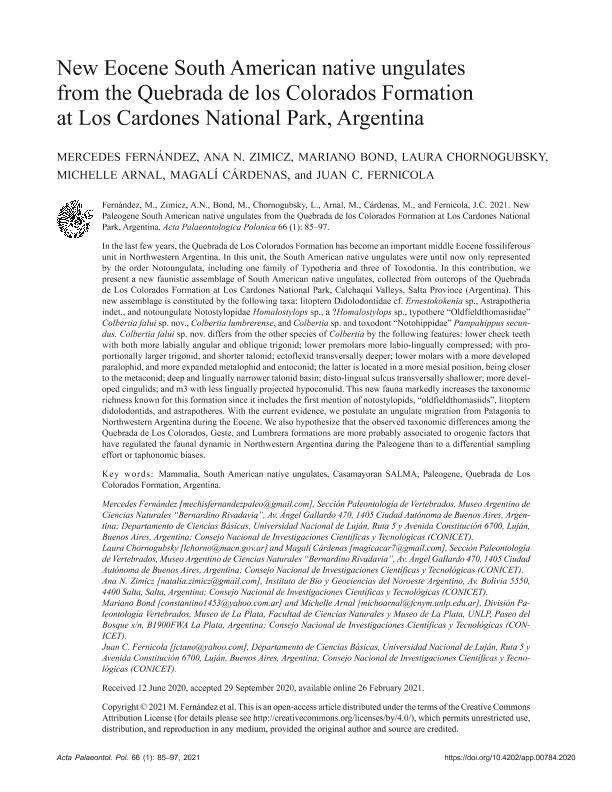Mostrar el registro sencillo del ítem
dc.contributor.author
Fernández, Mercedes

dc.contributor.author
Zimicz, Ana Natalia

dc.contributor.author
Bond, Mariano

dc.contributor.author
Chornogubsky Clerici, Laura

dc.contributor.author
Arnal, Michelle

dc.contributor.author
Cardenas, Magali

dc.contributor.author
Fernicola, Juan Carlos

dc.date.available
2021-04-30T11:47:22Z
dc.date.issued
2020-09
dc.identifier.citation
Fernández, Mercedes; Zimicz, Ana Natalia; Bond, Mariano; Chornogubsky Clerici, Laura; Arnal, Michelle; et al.; New Eocene south american native ungulates from the Quebrada de los Colorados Formation at Los Cardones National Park, Salta Province (Argentina); Polish Academy of Sciences. Institute of Paleobiology; Acta Palaeontologica Polonica; 66; 1; 9-2020; 85-97
dc.identifier.issn
0567-7920
dc.identifier.uri
http://hdl.handle.net/11336/131113
dc.description.abstract
In the last few years, the Quebrada de Los Colorados Formation has become an important middle Eocene fossiliferous unit in Northwestern Argentina. In this unit, the South American native ungulates were until now only represented by the order Notoungulata, including one family of Typotheria and three of Toxodontia. In this contribution, we present a new faunistic assemblage of South American native ungulates, collected from outcrops of the Quebrada de Los Colorados Formation at Los Cardones National Park, Calchaquí Valleys, Salta Province (Argentina). This new assemblage is constituted by the following taxa: litoptern Didolodontidae cf. Ernestokokenia sp., Astrapotheria indet., and notoungulate Notostylopidae Homalostylops sp., a ?Homalostylops sp., typothere ?Oldfieldthomasiidae? Colbertia falui sp. nov., Colbertia lumbrerense, and Colbertia sp. and toxodont ?Notohippidae? Pampahippus secundus. Colbertia falui sp. nov. differs from the other species of Colbertia by the following features: lower cheek teeth with both more labially angular and oblique trigonid; lower premolars more labio-lingually compressed; with proportionally larger trigonid, and shorter talonid; ectoflexid transversally deeper; lower molars with a more developed paralophid, and more expanded metalophid and entoconid; the latter is located in a more mesial position, being closer to the metaconid; deep and lingually narrower talonid basin; disto-lingual sulcus transversally shallower; more developed cingulids; and m3 with less lingually projected hypoconulid. This new fauna markedly increases the taxonomic richness known for this formation since it includes the first mention of notostylopids, ?oldfieldthomasiids?, litoptern didolodontids, and astrapotheres. With the current evidence, we postulate an ungulate migration from Patagonia to Northwestern Argentina during the Eocene. We also hypothesize that the observed taxonomic differences among the Quebrada de Los Colorados, Geste, and Lumbrera formations are more probably associated to orogenic factors that have regulated the faunal dynamic in Northwestern Argentina during the Paleogene than to a differential sampling effort or taphonomic biases.
dc.format
application/pdf
dc.language.iso
eng
dc.publisher
Polish Academy of Sciences. Institute of Paleobiology

dc.rights
info:eu-repo/semantics/openAccess
dc.rights.uri
https://creativecommons.org/licenses/by-nc-sa/2.5/ar/
dc.subject
SOUTH AMERICAN NATIVE UNGULATES
dc.subject
QUEBRADA DE LOS COLORADOS FORMATION
dc.subject
NORTHWESTERN ARGENTINA
dc.subject
CASAMAYORAN SALMA
dc.subject
PALAEOGENE
dc.subject.classification
Paleontología

dc.subject.classification
Ciencias de la Tierra y relacionadas con el Medio Ambiente

dc.subject.classification
CIENCIAS NATURALES Y EXACTAS

dc.title
New Eocene south american native ungulates from the Quebrada de los Colorados Formation at Los Cardones National Park, Salta Province (Argentina)
dc.type
info:eu-repo/semantics/article
dc.type
info:ar-repo/semantics/artículo
dc.type
info:eu-repo/semantics/publishedVersion
dc.date.updated
2021-04-28T21:26:41Z
dc.identifier.eissn
1732-2421
dc.journal.volume
66
dc.journal.number
1
dc.journal.pagination
85-97
dc.journal.pais
Polonia

dc.journal.ciudad
Varsovia
dc.description.fil
Fil: Fernández, Mercedes. Universidad Nacional de Luján. Departamento de Ciencias Básicas; Argentina. Consejo Nacional de Investigaciones Científicas y Técnicas. Oficina de Coordinación Administrativa Parque Centenario. Museo Argentino de Ciencias Naturales "Bernardino Rivadavia"; Argentina
dc.description.fil
Fil: Zimicz, Ana Natalia. Consejo Nacional de Investigaciones Científicas y Técnicas. Centro Científico Tecnológico Conicet - Salta. Instituto de Bio y Geociencias del NOA. Universidad Nacional de Salta. Facultad de Ciencias Naturales. Museo de Ciencias Naturales. Instituto de Bio y Geociencias del NOA; Argentina
dc.description.fil
Fil: Bond, Mariano. Universidad Nacional de La Plata. Facultad de Ciencias Naturales y Museo. División Paleontología Vertebrados; Argentina. Consejo Nacional de Investigaciones Científicas y Técnicas. Centro Científico Tecnológico Conicet - La Plata; Argentina
dc.description.fil
Fil: Chornogubsky Clerici, Laura. Consejo Nacional de Investigaciones Científicas y Técnicas. Oficina de Coordinación Administrativa Parque Centenario. Museo Argentino de Ciencias Naturales "Bernardino Rivadavia"; Argentina
dc.description.fil
Fil: Arnal, Michelle. Universidad Nacional de La Plata. Facultad de Ciencias Naturales y Museo. División Paleontología Vertebrados; Argentina. Consejo Nacional de Investigaciones Científicas y Técnicas. Centro Científico Tecnológico Conicet - La Plata; Argentina
dc.description.fil
Fil: Cardenas, Magali. Consejo Nacional de Investigaciones Científicas y Técnicas. Oficina de Coordinación Administrativa Parque Centenario. Museo Argentino de Ciencias Naturales "Bernardino Rivadavia"; Argentina
dc.description.fil
Fil: Fernicola, Juan Carlos. Consejo Nacional de Investigaciones Científicas y Técnicas. Oficina de Coordinación Administrativa Parque Centenario. Museo Argentino de Ciencias Naturales "Bernardino Rivadavia"; Argentina. Universidad Nacional de Luján. Departamento de Ciencias Básicas; Argentina
dc.journal.title
Acta Palaeontologica Polonica

dc.relation.alternativeid
info:eu-repo/semantics/altIdentifier/doi/http://dx.doi.org/10.4202/app.00784.2020
dc.relation.alternativeid
info:eu-repo/semantics/altIdentifier/url/http://www.app.pan.pl/article/item/app007842020.html
Archivos asociados
